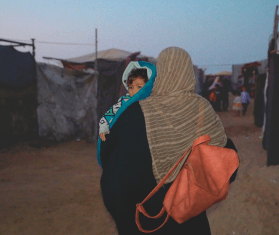On the evening of November 17, a densely populated area in Sumy city, northeastern Ukraine, was bombed. The explosion struck a courtyard surrounded by residential buildings, killing 11, among them a 9-year old boy and a 14-year-old girl. Eighty-four people were wounded, including 11 children.
The blast damaged 13 structures and dozens of apartments, according to preliminary information from local authorities.
Doctors Without Borders/Médecins Sans Frontières (MSF) emergency ambulance teams provided medical assistance to injured residents.
“It’s hard when you see the lifeless bodies of children,” says Hanna Sushkina, an MSF emergency doctor. “When we arrived, their bodies had already been carried out of the burning building. There was a long line of ambulances. The windows in nearby buildings were shattered, fires were raging, and rescue workers were extinguishing the flames while carrying out the injured and the deceased.”


MSF teams and others respond to the bombing on November 17. Ukraine 2024 © MSF
Residents need care amid power outage
The MSF team treated four residents with injuries, including soft tissue wounds. “One patient described sitting on her sofa when the attack occurred. Shattered glass caused cuts, and many people we saw were experiencing acute stress and disorientation,” Sushkina explains.
The attack caused a temporary power outage in the area, and rescue crews used floodlights to continue their work in the dark. While MSF was on site, there was a second strike nearby, prompting the team to relocate patients to a nearby shelter to continue care.
“Responding to these strikes is extremely difficult. Ongoing bombardment or even double taps put medical responders at risk,” says Thomas Marchese, MSF chief emergency coordinator in Ukraine. “This can delay the response time, limiting essential medical care in an emergency situation.”
MSF’s work in Sumy, Ukraine
Since October 2024, MSF’s ambulance project has been active in Sumy, offering medical care during missile strikes and transferring patients between health care facilities across Ukraine. In just two months, MSF teams have transported more than 150 patients from Sumy that required intensive care referrals.
The Sumy region, which borders the Russian Federation to the north and east, has faced a worsening humanitarian situation, as reported by the United Nations Office for the Coordination of Humanitarian Affairs. In August and September, the situation deteriorated significantly, with a notable surge in attacks. Specifically, in September, the number of attacks in the Sumy district rose by 141 percent compared to the total over the preceding 12 months.

Why mental health is crucial in successful recovery for Ukraine’s war-wounded
Read moreAt the start of the escalation, some cities of the region were temporarily occupied by Russian forces. Although these areas returned to Ukrainian control in early April 2022, people in the region continue to endure daily attacks on critical infrastructure.
MSF has supported communities in Sumy since the areas were retaken. Teams provided psychological support and early physical rehabilitation for residents, including at the hospital in Trostianets. In March 2024, MSF condemned an attack on this hospital, which had been a key partner in delivering care.




